- Home
- Sebastian Faulks
A Week in December Page 5
A Week in December Read online
Page 5
‘I suggest you apply for a job with Shields DeWitt,’ Veals told Murray as he cut up his credit cards. This was an investment house of legendary rectitude, known to Veals as the Vatican. Its directors were often seen at Covent Garden, in black tie, or at dinners for charities to which they were willing and hefty donors.
Murray had been in place for only four years. For the first three years of High Level’s life, the compliance officer had been ... Well, there was only one person who knew the company intimately enough and who had done the day-long course required by the FSA; throughout its first prodigious growth spurt, the compliance officer of High Level Capital had been its founder and chief executive, John Veals.
In Murray’s place, Veals offered the job – naturally enough – to someone from Allied Royal, a ductile young man called Simon Wetherby. Veals promised to double his salary and bonus package, provided he could stay in ‘lock step’ with High Level’s strategic ambition and not forget who paid him. Wetherby was amazed and delighted by the approach and joined High Level as soon as he could clear his ARB desk. The two men spoke every morning, and in the course of six months of doing little more than shooting the breeze, Veals had debriefed Wetherby on all he knew about ARB. It was natural that they’d want to talk about the most remarkable event of recent months, the purchase of the Spanish bank; rude not to, as Wetherby happily agreed.
Veals took no written notes during these conversations and never let it show if anything that was said was of particular interest to him. Veals was known to be a man obsessed by detail – one or two people had warned Wetherby that he might be driven mad by this – and Wetherby knew that the size of his first annual bonus would shortly be calculated. He told Veals all he knew about the debt covenants relating to the acquisition of the Spanish bank.
John Veals merely nodded; but somewhere in the thicket of Wetherby’s detail, he had caught a glimmer of movement, as a sight-hound sees the twitch of a rabbit’s ear across a field of grass. Pushed to the last fragment of his recollection by Veals’s insistent ‘And was there anything unusual?’, Wetherby recalled a debt-covenant clause inserted late in the negotiation by a lawyer anxious to protect the group of other banks who had lent Allied Royal much of the cash necessary to make the purchase. The covenant stated that if, following the successful acquisition, the market capitalisation of the enlarged Allied Royal should at any point fall below a certain level (a level viewed as impossible in normal financial weather) the creditors would have the right to call in their loans in full. Such a call would be impossible for ARB to meet without issuing yet more shares.
‘Surely the middle office checked all this?’ said Veals. ‘I mean the regulators are hot on all this, aren’t they? You know, tier-one capital ratios and all that crap.’
‘Yes,’ said Wetherby. ‘But it was late. It was in a side letter, I believe. I didn’t see it myself, it wasn’t my job, but I was told about it by a friend in the leverage finance team. The FSA may never have seen the letter. And of course there was so much momentum for the deal at this point that—’
‘Yeah, yeah, they’d all got wood by then.’
‘Exactly.’
For some weeks, Veals had reflected on this information, and how to make it work to his advantage. If the market cap or share value (Wetherby was not exactly sure about the triggers) of ARB did fall below the agreed level, those who had lent the money – large investment banks and insurance companies – would not be legally obliged to call in their debts (indeed, they’d be better advised not to); but the mere emergence of the news would cause a panic – and a run on the bank’s deposits.
Veals discussed his idea briefly with Stephen Godley.
‘Christ, John,’ said Godley. ‘Talk about working the blind side. All those pensioners. You’ll be attacked by an army of zimmer frames. Savaged by—’
‘By a toothless fucking army,’ said Veals.
The precedent of a failing bank was less than three months old. In September, only three months ago, the British government had nationalised an overextended mortgage lender in north-east England as it was on the verge of going broke. The Prime Minister, like all politicians in Veals’s experience, was childishly awed by cash – by the size of the contribution made to the economy by financial services. Though by instinct a state socialist, hot for high tax and interference, he was also a career politician, and he knew that his own life depended on the economy’s continuing to grow. He had to protect the City’s special interests and yield to the demands of its senior executives; he had no choice.
Veals believed the Government would be loth to interfere with Allied Royal if it began to ail seriously, or plunge; it would show the PM to be a nanny and a fusspot who didn’t trust the market. His party had spent many years out of office trying to convince the voter that it loved the market more even than its rival did; he couldn’t afford to act like a socialist at this late stage. On the other hand, he would eventually calculate that he needed the combined votes of ARB depositors, creditors and pensioners to keep himself in power. He couldn’t let it die; he would have to take it over.
High Level’s reputation would suffer when it emerged that they had made a killing from the demise of a bank; the plight of the pensioners in particular would keep the story in the newspapers for weeks. However, Veals had ridden storms before, notably one about the repayment of an African debt; he could tough it out again, and he believed that in his own world his reputation for skill and ruthlessness would be enhanced. If he took care to ensure that the majority of the trading was conducted in non-regulated instruments, outside the jurisdiction of the Financial Services Authority, there wasn’t much they could do to stop him. In any case, FSA fines were tiny.
First, though, before any of this could begin, Veals needed to know for certain that the debt covenant existed. He was preparing to put on the largest position of his life and wasn’t going to do it on the anecdotal evidence of a wimp like Simon Wetherby. He needed to see the document itself, and for this purpose he had in the first week of June telephoned Vic Small at Greenview Alternative Investment Services.
They met at the Moti Mahal in Waterloo, and, over roghan josh and fizzy lager, Veals gave Vic Small an envelope full of cash. Two weeks later, a woman called Vera Tillman began to work as a cleaner at Allied Royal in Canary Wharf. She came with respectable references and a willing attitude; she was also receiving fat envelopes of cash from Vic Small to find and copy the relevant document.
She had been there almost six months. ‘Can’t she work a photocopier?’ Veals asked Small. ‘She must have worn out the fucking carpet with all that vacuuming.’
‘It’s complicated,’ Small replied. ‘It’s a very proper company. It has ID cards and iris recognition. All the bells and bloody whistles.’
Then, on Friday December 14, Veals had had an early Christmas present. Reception told him there was a gentleman outside who wouldn’t leave until he’d personally handed over an envelope to him. A business card was sent through; it bore the Greenview crest. Warily, Veals went out to reception and took the envelope. The ‘gentleman’ was not the usual motorcyclist whose offerings went through the post room, but an African in a blue suit with a knitted tie. There was no return address on the envelope and no signature was required for it. Back in his private office, Veals slid out the papers. There were only three sheets of A4, but they contained a well-drafted debt covenant, signed, executed and witnessed, relating to the Allied Royal takeover of the Spanish bank. He checked and rechecked to make sure it was fully executed, not just a draft. It was all right. Simon Wetherby’s recollection appeared to be correct in every respect.
Veals checked his watch. Seven o’clock: home time. Contrarian in almost, though not quite, everything, he took the Underground from St James’s Park. Most hedge-fund managers were driven home from their Mayfair offices in German saloons. Some thought this added to their mystique, to be anonymous, disdaining City ostentation and overpriced champagne; one or two cultivated an academic lo
ok – tweed jackets, trainers – stressing the intellectual aspect of their mathematical day. There was also a practical reason for such men, each personally possessing hundreds of millions of pounds, to have a secure car and driver, and that was to avoid the possibility of kidnap.
John Veals did the opposite. For a start, he worked in Victoria. The herd was always wrong, he thought (except when it was right, and then he had an early position in the forefront of stampeding hooves). St James’s Park was a clean station and the travellers were kept well informed about the service as they waited on the hosed and swept platforms. It was the headquarters of Transport for London and no broken light bulb remained unchanged for more than six minutes.
On the train, Veals sat with a briefcase on his lap and watched the Sunday tourists with their wheeled luggage and their rucksacks. They chattered as they pored over guidebooks, glanced up at the Tube map overhead, trying to reconcile the two. What false picture of a city did these people have? Veals wondered. Their London was a virtual one, unknown to residents – Tower and Dungeon, veteran West End musicals and group photographs beneath the slowly turning Eye; but Veals believed it was important for him to be aware of other people, natives and visitors alike, however partial and bizarre their take on life. Since his own reality derived from numbers on a computer terminal, he thought it wise to keep an eye on flesh and blood; there might still be something he could profitably learn from them.
As John Veals made his way back home from Holland Park Tube station, a bicycle with no lights on shot past him along the pavement, making him leap to one side.
He swore briefly, then let himself into a white-pilastered house. It was in a quiet street, far enough away from the noise of Holland Park Avenue or the rowdy communal gardens of Notting Hill, where it always seemed to be firework night. For five years when his two children were still small, Veals and his wife Vanessa had endured the life of such a garden, where American investment bankers celebrated July 4, Hallowe’en, Thanksgiving, Christmas, New Year’s (always with that irritating possessive), Spring Break, Easter, innumerable bank holidays and – biggest explosion of all – Bonus Day, a moveable feast of the patron saint of Mammon, usually some time in January. Veals’s breaking point had come when a series of Baghdad-intensity explosions woke his children from their sleep at midnight.
He went round and rang the bell next door. ‘What the hell’s going on?’
‘It’s Bastille Day,’ said his American neighbour, perplexed. ‘Come in and have a glass of champagne.’
‘Ever been to Paris, Johnny?’ said Veals, with grim restraint.
‘Only for a meeting, once,’ said the American with the matches.
‘You’re like that cartoon in the sixties,’ said Veals. ‘Two astronauts approaching the moon. One’s saying, “Have I been to Paris? God, no. This is the first time I’ve left the USA.” Now put your fucking toys back in the box.’
Soon afterwards, the family moved to a dark but quieter street and installed the Filipina nanny in a small room, once the coal-hole, with a glass roof, to the right of the steps as you went up to the front door with its brushed nickel fittings and ‘historic’ paint colour. It was peaceful here, and when Veals got to the half-landing, to a study that overlooked the small but mercifully private garden, he fired up the Internet to check the market news. Nothing disastrous. Vanessa had left a postcard from Sophie Topping on his desk: a ‘pour-mémoire’, Sophie called it, about her dinner on Saturday. Veals grimaced.
At that moment he heard his daughter’s heavy footsteps going downstairs. He went out on to the landing in time to see Bella walking down the hall towards the front door with a small pink rucksack on her back.
‘Where are you going?’
‘I’m having a sleepover at Zoë’s,’ she called up.
‘Didn’t you go there last night?’
‘No, Dad. I told you. That was Chloë’s.’
‘Have you—’
The door banged and Bella had escaped.
Veals went to find his wife, who was in the bath. ‘Where’s Finn?’ he asked from the doorway.
Finbar, their sixteen-year-old son, was up in his top-floor room watching a large flat-screen television and rolling a joint. He had bought £20 worth of skunk on Friday from a boy in Pizza Palace during a break from school, where he was in his GCSE year. Spread out on an atlas, he had three papers and the tobacco from a cigarette. The book was heavy on his knees and he envied his parents’ generation, for whom LP sleeves must have provided an ideal surface. Most of his own music was digitised, and CD covers were anyway too small for the task – not that they were much good at the day job, either, as the cheap hinges usually snapped within the week, leaving him with naked, scratch-prone discs of Wind in the Trees by Stefan Everson or Forecasts of the Past by New Firefighters. But rolling up on top of a picture of Neil Young’s patchwork jeans or the Beatles’ psychedelic uniforms ... That must have been something, he thought.
Finbar sat back against the end of the bed and fired up the joint. The flame from the disposable lighter showed up his smooth face with its half-dozen spots on the chin, a child’s long-lashed eyes and a mess of brown curls. His bedroom was a twenty by twenty foot den, lit by dimmed and recessed ceiling lights, with a tight-weave grey carpet and an en suite wet room with imported American fittings and a shower as forceful as a Yosemite cascade. Framed posters of Wireless Boys and Evelina Belle bisected the wall spaces. Through the windows Finn could see the raised stone parapet that ran along the back of the house. He flipped open his phone and hit the pizza number for a delivery. He wasn’t hungry yet, but in forty minutes’ time, post skunk, he would be.
Channel 7 was about to start his favourite programme, It’s Madness. Finn settled down to his solitary entertainment, easing back the ring-pull on a can of lager. He didn’t really like beer, but he was trying hard to acquire the taste, since smoking made him thirsty first, before it made him hungry. He didn’t really like smoking either, if he was honest, but he loved the effect of skunk: the sand-filled sock to the back of the head, the drying mouth, the sense of muscles in heavy motion, of a nervous quickening that couldn’t be translated into action because everything was slowed down – as though time had ceased to operate, leaving him luxuriously alone to savour the last sound wave of the ringing cymbal or aching voice of Shoals, or Weir of Dunkeith – or, as now, the modern comedy of Channel 7.
The first patient on It’s Madness was suffering from ‘bipolar disorder’.
‘Sounds like something you get in the Arctic,’ said Lisa, one of the celebrity judges. ‘Is it anything like frostbite?’
The audience began a long helpless chuckle as the patient – a red-faced, bedraggled woman in her twenties – explained her symptoms. ‘Sometimes it’s like me ’ead’s on fire, there’s so much to say and do, like not enough time in the world to say all I’ve got on me mind and I can’t sleep, I’ll go like ten weeks without sleeping properly and I’ll walk the streets at night at four or five in the morning, talking away to meself cos—’
‘Because no one else is up at that hour, I imagine,’ interrupted Barry Levine, another of the celebrity judges, amid more laughter.
Finbar sucked on the joint and held the smoke in his lungs. Barry Levine was one of those all-purpose TV stars who cropped up on too many programmes for his liking; they’d roped him into It’s Madness when some writer woman turned out to be too long-winded; she hadn’t really got the joke – the whole point of the programme – which was that it was a comedy.
Lisa, who’d been lead singer with a successful but short-lived band called Girls From Behind, was better. She played the dumb-blonde part and was quick to get the wrong end of the stick – so quick, in fact, that Finn suspected it was thrust into her hand before the show began. Television was all a con – everyone knew that – but It’s Madness worked because, in the words of the programme makers, it was ‘there to make people think differently, to challenge their preconceptions’.
The bipo
lar woman, who’d now been given the nickname Captain Scott, was explaining how at other times she was caught in a downswing that could last for months. ‘Then it’s like I’m in a world which is only black and white before colour had been invented and I’m like so tired I can’t move, I just want to stay in bed for days and days.’
‘Yes, Scotty, we’ve all had days like that,’ said Terry O’Malley, the boss of the panel. ‘It’s called a hangover.’ He waited for the laughter to subside before saying, ‘All right, everybody. It’s time for ...’
He stood up and opened his arms to the audience, who shouted back as one: ‘The Men in White Coats!!!’
Finbar didn’t like this part of the programme. Two psychiatrists (though he doubted they were really qualified) gave an assessment of what treatment the patient needed, how much it would cost and whether she should be admitted to a hospital. While the debate roared, there came a buzzing, relayed from the front door. Finbar went unsteadily to the stairhead to go down and let the pizza man in.
He had heard his parents come and go half an hour before, but didn’t bother to leave his room. Talking to them was an ordeal. His father never knew what to say and seemed anxious that he might betray some ignorance of Finn’s life; neither had quite recovered from the moment the year before when John Veals inadvertently revealed that he thought Finn had already taken his GCSEs. Finn presumed his parents had gone out to their usual Sunday evening dinner at the Simla Rest House, a maniacally overpriced Indian place in Mayfair.

 Devil May Care
Devil May Care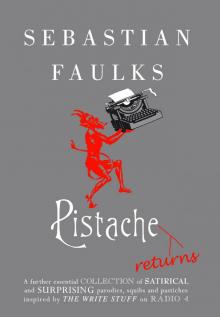 Pistache Returns
Pistache Returns The Girl at the Lion D'Or
The Girl at the Lion D'Or Pistache
Pistache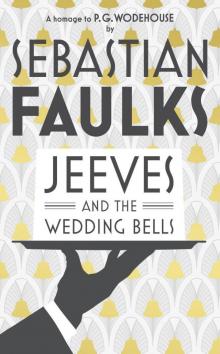 Jeeves and the Wedding Bells
Jeeves and the Wedding Bells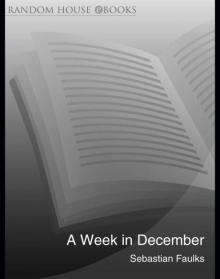 A Week in December
A Week in December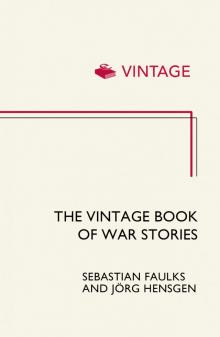 The Vintage Book of War Stories
The Vintage Book of War Stories Engleby
Engleby Birdsong
Birdsong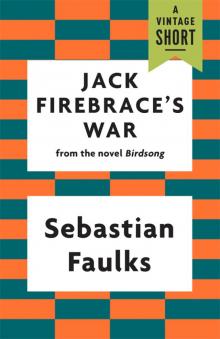 Jack Firebrace's War
Jack Firebrace's War Where My Heart Used to Beat
Where My Heart Used to Beat A Possible Life
A Possible Life The Fatal Englishman: Three Short Lives
The Fatal Englishman: Three Short Lives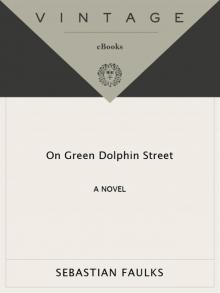 On Green Dolphin Street
On Green Dolphin Street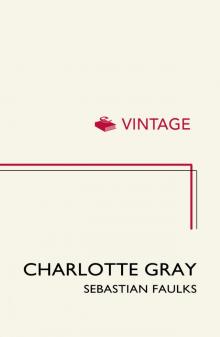 Charlotte Gray
Charlotte Gray A Broken World: Letters, Diaries and Memories of the Great War
A Broken World: Letters, Diaries and Memories of the Great War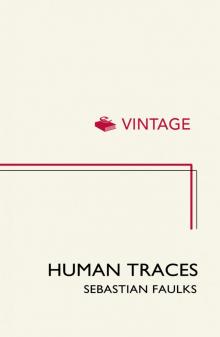 Human Traces
Human Traces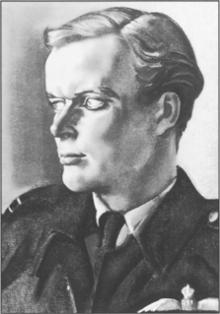 The Fatal Englishman
The Fatal Englishman A Broken World
A Broken World Paris Echo
Paris Echo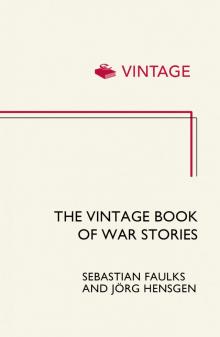 War Stories
War Stories Girl At the Lion d'Or
Girl At the Lion d'Or